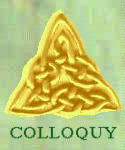

CW: basically you don't use them. As I was saying: when I do a task that requires alot of "higher order" processing I tend to forget about my depression. Possibly this is a significant part of why "talking it out" with someone else seems to ease the depressed state - not so much that you develop true insight but that you engage another part of your mind to offset the imbalance. In one study on meditation that I read it was not found to be effective in treating anxious patients. Meditation having the tendency to shut down these "higher order" processes (in my limited experience). However, meditation is very effective in preventing anxious episodes from recurring. When you are experiencing acute anxiety you are probably at the wrong end of the loop. Obviously anxiety isn't depression but they are related.
CML: Higher-order mental processes involve the release of their own neurotransmitters, which may tend to counter or displace the effects of those causing the disorder. As you observe, meditation precludes higher-order thought and thus lacks this benefit. But where anxiety itself involves a misdirected form of higher-level thought, meditation could prevent its recurrence by exactly the same means.
CW: It actually does work on anxiety it just takes an extremely long time to act when you are in the middle of the anxiety. Mainly it gives you a different perspective on whatever mental event you happen to be experiencing in the sense that you can take on a "higher" level view in which mental events are seen as temporary manifestations. It is not so much that one watches oneself but that one doesn't continue to generate more anxiety.
CML: Seems as though the process might still be mediated by changes in the levels of various neurotransmitters (by the way, this week's issue of Newsweek actually suggests that Bill Clinton's wild ways might be due to runaway levels of dopamine!)
JW: I have a short discussion topic I would like to
introduce into our forum. It reads as follows:
A short while ago I had heard someone mention about research
being done which could possibly provide a positive correlation
between IQ and ( I believe ) retinal response.
I am curious about this concept. Does anyone know of any actual studies being done at this time; if any group is conducting their own research into this possibility of measuring human cognizant potential?
It would indeed be fascinating if at some point in the future one were able to get a true indication of his or her mental capability, merely by having the rate of response gauged. Perhaps someone would like to enlighten me on any hard data being done at this time?
WRW: It sounds far-fetched. I am sure there is a much more scientific approach than I can imagine. If we start making examinations that culture free then we will soon be allowing most of the brighter animals to be considered on the level of most humans. I know the test will surely be triggered by something that only humans can respond to but, who knows.
Why don't we all resolve ourselves to the fact that measuring intelligence is a extremely difficult task? Although our current methods have many faults, they have advanced significantly over the century. We now have time tests and power tests that themselves have brought about raging debate. We surely need to expect some level of obtained cognitive skills to help determine intelligence. If we ever get to the point that we are assigning intelligence or intellectual values to reflexive responses the public will have very little regard for it. There are a good many individuals who fall below the 99.5 percentile who are intelligent and have very good sense. Many of these make the decisions that fund research and assist in a broad acceptance of new ideas. Some of these will tell us that we are silly in our pursuit of measuring intelligence as it exists today. If his sounds anti-intellectual then so be it. I work with a good many of these people.
JCC: I found a decent short summary of retinal response/ evoked potential research by Fred Britton, writing in Gift of Fire, No. 83**. The research was apparently pioneered by C.R. Brand and extended by the team of Zhang, Caryl, and Deary at U. of Edinburgh. It would seem also to be an "objective" but problematic measure related to certain forms of simple decision processes. True, these are the stock-in-trade of conventional IQ tests, which reward response speed to a greater or lesser degree. Consider the points elegantly raised in Chris' article on IQ and IEQ, linked to our page. It's interesting stuff, perhaps because of the very elusiveness of clear definitions and measures of intelligence. What's noteworthy is that seeking a definition has widened appreciation for its myriad forms.
CML: At the dawn of intelligence testing, intelligence was equated with sensorimotor capacity; only later was the problem-solving aspect emphasized. A more recent development is usually associated with the modern IQ patriarch Arthur Jensen. One of Jensen's students investigated the possibility that a culture-free measurement of intelligence might be possible through the measurement of cognitive reaction time. For example, two lines would be flashed on a screen, and the subject would press, as quickly as possible, a button corresponding to the longer of the two. In fact, such measurements were found to display a positive correlation with general intelligence as measured on conventional IQ tests.
To understand the theoretical basis of the correlation, one has merely to go to computation theory. In computation theory, one considers the basis of machine recognition, in which machine input (a logical pattern) is matched with some aspect of the machine's internal programming and thereby "recognized" by the machine. As it turns out, this is what occurs in human cognition: a fact, relationship, correspondence, or even an emotion or intuition is "recognized" as a basis for neural association and other cognitive processes. So a reaction-time measurement of the kind described above is thought to measure the speed of basic cognitive operations and thus overall cognitive efficiency.
Of course, in Jensen et al's experiments, the measurement involved a voluntary motor response (pushing the button). Someone wishing to continue this line of research might want to use a CAT scanner instead to directly monitor brain activity for an internal response. This may be what Joel refers to as "retinal response"; a response measured strictly within retinal cells would be useless, unless this response involved feedback from the brain. The idea of a feedback loop between eye and brain, by the way, is an intriguing one, evoking dream and REM sleep research. Unfortunately, I'm not up-to-date on this line of inquiry (unless I got there simply by making the suggestion!).
In any case, intelligence involves too many complex brain structures to be comprehensively measured through feedback relationships with less complex organs. Such measurements would be only superficial...a preliminary indicator requiring a more thorough investigation in any given instance.
** Gift of Fire is the journal of the Prometheus Society.
